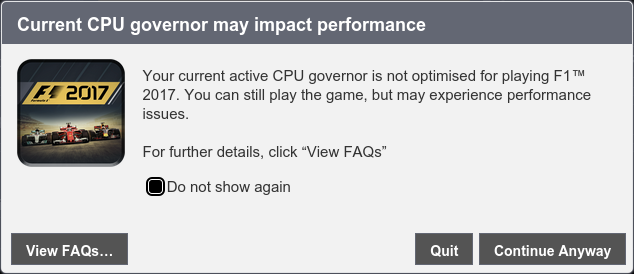GameMode is a new daemon/lib combo for Linux that will allow you to optimize your PC for gaming. It’s not magic, it won’t suddenly make your Linux games suddenly get better performance, but it’s something that can help.
You might have seen a message box pop up with some more recent Linux ports from Feral Interactive, one that tells you that your current CPU governor is not optimised—like this:
When games end up waiting on the GPU, some CPU performance governors may downclock the CPU and then up it again later, which can result in performance problems. GameMode, as it is right now, is to help you with that. Curious about it and wanting to know a little more direct from the developers, Feral agreed to answer some quick questions I had about it:
1) Can you give us a rundown on what exactly GameMode is and why Linux gamers might need it?
“GameMode is a daemon/library combo for Linux, written in C, which allows games to request that a set of optimisations be temporarily applied to the host OS. These optimisations improve the performance of the game.
To apply these optimisations, some of our games require that users manually swap the CPU governor using sudo privileged commands. We've had some feedback from people saying that they'd prefer not to have to do so much setup in order to get the best performance from their game. Further to this, some users voiced concerns about the increased energy usage that might result from leaving the CPU in a higher power usage mode.
By automatically applying these optimisations when the game is running and removing them when it isn't, GameMode saves users the trouble of having to tinker. It also ensures that the CPU is restored to a more efficient state when they've finished playing.”
2) You say it is "intended to be expanded beyond just CPU governor states", what extras did you have in mind?
“A lot of good ideas have been put forward by beta testers, including de-activating tools like f.lux, swapping KWin from OpenGL to xrender, and changing users' chat client status to "Playing X". GameMode is Open Source, so pull requests, or forks with features like these are welcome.”
3) To be clear for our readers, is this something that will ship built-in with Feral games and will users have to do any manual steps to enable it?
“GameMode won't ship with the games; since it's open source, users will need to install it themselves using the steps on GitHub. The tool will only need to be installed once, and will work with all future Linux titles released by Feral.
It will also work with previously released games, provided users adjust their launch options on Steam.”
It’s currently under a “BSD 3-Clause License (Revised)” license and you can find out more on GitHub. It’s certainly going to be interesting to see how this project evolves over time, could end up being something extremely useful. It already made its way to the AUR for Arch users.
Once you've installed it using their instructions, you can then tell any game to use it by doing this command:
LD_PRELOAD=/usr/\$LIB/libgamemodeauto.so ./game
You can also add it as a Steam launch option for each of your games like so:
LD_PRELOAD=$LD_PRELOAD:/usr/\$LIB/libgamemodeauto.so %command%
If you wish to know what current CPU governor is in use, you can run this command in terminal:
cat /sys/devices/system/cpu/cpu0/cpufreq/scaling_governor
I actually had pre-announcement access to it and testing it has given me some good early results. Obviously this will be game and hardware dependent and yes, all tests were done over multiple runs to ensure it wasn't a fluke.
Testing it with F1 2017 for example, gave these FPS results:
That might not look like a big difference, however, behind the FPS results are the frame timings:
| Without Game Mode | With Game Mode | |
|---|---|---|
| Min Frame Time | 10.32ms | 10.03ms |
| Average Frame Time | 13.31ms | 11.88ms |
| Max Frame Time | 19.36ms | 16.02ms |
As you can see, it has helped to reduce frame timings while increasing the overall framerate, so using GameMode (or manually using performance mode) can have an impact resulting in a smoother game. Using GameMode instead of doing it manually, does have the benefit of your CPU reverting to a more power efficient mode afterwards of course.
Testing Deus Ex: Mankind Divided was a slightly different story, as it always gave a better minimum FPS score when using GameMode, but the average and maximum showed little difference—certainly still worth it though! As for frame timings, the built-in benchmark doesn't give them.
Company of Heroes 2 is similar to Deux Ex with the benchmark mode only giving FPS scores. During my testing, both in the benchmark mode and actually playing it, the difference was noticable when using GameMode—with it being much smoother overall:
Again, to stress, your results will depend on your hardware and it's no different to manually changing your CPU governor to performance—for now (until they do more with it), although it does bring it back down to powersave or ondemand automatically which is nice.
Rise of the Tomb Raider will be the first game from Feral to have support for it integrated, so you won't need to give it any special launch options. However, you still need to install the tool yourself.
It’s great to see Feral Interactive do more open source projects, as they already have their game launcher scripts up on GitHub too.
Edit: I just realized the latter could be because I run a custom kernel.
Last edited by Brisse on 10 Apr 2018 at 10:31 am UTC
I'm on default setting for cpu power , which is "on demand" i guess.
Will try that , on i7 7700HQ.
[gamemode-git](https://aur.archlinux.org/packages/gamemode-git/)
[gamemode (stable releases)](https://aur.archlinux.org/packages/gamemode/)
[lib32-gamemode-git](https://aur.archlinux.org/packages/lib32-gamemode-git/)
[lib32-gamemode (stable releases)](https://aur.archlinux.org/packages/lib32-gamemode/)
(edit : added lib32 variants)
Last edited by ysblokje on 11 Apr 2018 at 11:08 am UTC
Good but I would prefer not to install anything. Could we simply run a command before and after playing?
Yes you can.
echo performance | sudo tee /sys/devices/system/cpu/cpu*/cpufreq/scaling_governor
echo powersave | sudo tee /sys/devices/system/cpu/cpu*/cpufreq/scaling_governor
https://www.gamingonlinux.com/articles/you-will-want-to-force-your-cpu-into-high-performance-mode-for-vulkan-games-on-linux.9369
Last edited by Faattori on 10 Apr 2018 at 10:44 am UTC
Good but I would prefer not to install anything. Could we simply run a command before and after playing?
You could do all it does yourself in a script before and after playing. It will just need sudo to do anything.. That's what a daemon keeps away from the user.
I guess this won't do much for us AMD-users since they don't usually default to "powersave"? When I used Ubuntu 17.10 I think it defaulted to "ondemand" with my Ryzen 1700X, and now I'm on Debian Sid which seems to default to "performance".I messed up the wording a little there, it works with both powersave and ondemand :)
Edit: I just realized the latter could be because I run a custom kernel.
FYI: powersave is the default for newer intel CPUs, ondemand is for older (source
Depending on the scaling driver, one of these governors will be loaded by default:
ondemand for AMD and older Intel CPU.
powersave for Intel CPUs using the intel_pstate driver (Sandy Bridge and newer).
Last edited by Liam Dawe on 10 Apr 2018 at 11:11 am UTC
I guess this won't do much for us AMD-users since they don't usually default to "powersave"? When I used Ubuntu 17.10 I think it defaulted to "ondemand" with my Ryzen 1700X, and now I'm on Debian Sid which seems to default to "performance".
Edit: I just realized the latter could be because I run a custom kernel.
it does impact. ondemand mode is not good either. it will switch between clocks in games a lot (not in all games) and will cause fps drops. i run my ryzen always on performance mode when i go gaming. It has pretty big impact on the minimum framerates when running ondemand.
if you are on performance mode then its fine, its not the default behaviour on most distros though. Running it on performance constantly isnt that great also imo, but ryzen is pretty efficient (on idle with performance mode enabled) and just adds +20W compared to ondemand judging by my UPS reporting
to avoid sudo thing i created a polkit rule for cpupower to let me execute the command without sudo :)
looking forward to see this gamemode being implemented into the future games of feral and others.
Last edited by Xpander on 10 Apr 2018 at 11:05 am UTC
Microsoft must be like WTF!! They have million dollars (if not billion) of ressource to make a game mode that is slower than normal mode, and a small but well trained team of porter release an open source that actually works as intended!
Thank you Feral Interactive, good job!
Last edited by Jahimself on 10 Apr 2018 at 11:05 am UTC
For archlinux users I created some aur packages.
[gamemode-git](https://aur.archlinux.org/packages/gamemode-git/)
[gamemode (stable releases)](https://aur.archlinux.org/packages/gamemode/)
Give this man a cookie! This is the reason why I switched to an Arch-based distro. ;)
And big thanks to Feral for continuous support of us Linux freaks!
Last edited by Grimfist on 10 Apr 2018 at 11:03 am UTC
Spoiler, click me
xpander@arch ~ $ cat /usr/share/polkit-1/actions/org.archlinux.pkexec.cpupower.policy
<?xml version="1.0" encoding="UTF-8"?>
<!DOCTYPE policyconfig PUBLIC
"-//freedesktop//DTD PolicyKit Policy Configuration 1.0//EN"
" http://www.freedesktop.org/standards/PolicyKit/1/policyconfig.dtd">
<policyconfig>
<action id="org.archlinux.pkexec.cpupower">
<message>cpupower without super user</message>
<icon_name>cpupower</icon_name>
<defaults>
<allow_any>yes</allow_any>
<allow_inactive>yes</allow_inactive>
<allow_active>yes</allow_active>
</defaults>
<annotate key="org.freedesktop.policykit.exec.path">/usr/bin/cpupower</annotate>
<annotate key="org.freedesktop.policykit.exec.allow_gui">true</annotate>
</action>
</policyconfig>and then keybinds for:
pkexec cpupower frequency-set -g performance && notify-send "Performance Mode" "Cpu clocks set to perfromance mode" -t 2000 -i messagebox_infoand pack to normal:
pkexec cpupower frequency-set -g ondemand && notify-send "Ondemand Mode" "Cpu clocks set to ondemand mode" -t 2000 -i messagebox_info
I won't be installing it yet, as I already use indicator-cpufreq to change the cpu governor. But When other improvements come I probably will give it a spin.
Last edited by Marky on 10 Apr 2018 at 11:20 am UTC
I guess this won't do much for us AMD-users since they don't usually default to "powersave"? When I used Ubuntu 17.10 I think it defaulted to "ondemand" with my Ryzen 1700X, and now I'm on Debian Sid which seems to default to "performance".
Edit: I just realized the latter could be because I run a custom kernel.
Debian testing defaults to "ondemand". I have scripts that switch it to "perforamnce" for certain games, and then back to "ondemand".
Shouldn't this kind of feature be built-in with the OS?
It is. Check:
cpupower help frequency-set
sudo cpupower frequency-infoLast edited by Shmerl on 10 Apr 2018 at 11:20 am UTC
For now we gotta use the good old terminal.
For archlinux users I created some aur packages.
Did you find a way to test it?

















 How to set, change and reset your SteamOS / Steam Deck desktop sudo password
How to set, change and reset your SteamOS / Steam Deck desktop sudo password How to set up Decky Loader on Steam Deck / SteamOS for easy plugins
How to set up Decky Loader on Steam Deck / SteamOS for easy plugins
See more from me